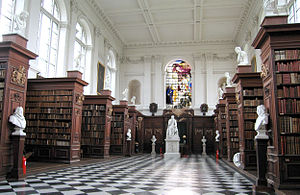Portal:Library and information science
The Library and Information Science PortalLibrary science and information science are two closely related and often intersecting disciplines that deal primarily with the organization and retrieval of information. Library science is an interdisciplinary social science incorporating the humanities, law and applied science and studying topics related to libraries; the collection, organization and dissemination of information resources; and the political economy of information. Library science has also historically included archival science, although a conceptual distinction between libraries and archives has evolved over time. Amongst the varied topics of study that fall within library science: how information resources are organized to serve the needs of select user groups; how people interact with classification systems and technology; how information is acquired, evaluated and applied by people in and outside of libraries as well as cross-culturally; how people are trained and educated for careers in libraries; the ethics that guide library service and organization; the legal status of libraries and information resources, and the applied science of information technology used in documentation and records management. Library science is constantly evolving, incorporating new topics like database management, information architecture and knowledge management. Information science (also referred to as information studies) is an interdisciplinary science primarily concerned with the collection, classification, manipulation, storage, retrieval and dissemination of information. Information science studies the application and usage of knowledge in organizations, and the interaction between people, organizations and information systems. It is often, though not exclusively, studied as a branch of computer science or informatics and is closely related to the cognitive and social sciences.
Censorship is the removal or withholding of information from the public by a controlling group or body. Typically censorship is done by governments, religious groups, or the mass media, although other forms of censorship exist. The withholding of official secrets, commercial secrets, intellectual property, and privileged lawyer-client communication is not usually described as censorship when it remains within reasonable bounds. Because of this, the term "censorship" often carries with it a sense of untoward, inappropriate or repressive secrecy.
Censorship is closely related to the concepts of freedom of speech and freedom of expression. When overused, it is often associated with human rights abuse, dictatorship and repression. The term "censorship" is often used as a pejorative term to signify a belief that a group controlling certain information is using this control improperly or for its own benefit, or preventing others from accessing information that should be made readily accessible (often so that conclusions drawn can be verified).
Benjamin Franklin (January 17 [O.S. January 6] 1706 – April 17, 1790) was one of the best-known Founding Fathers of the United States. He was a leading author, politician, printer, scientist, philosopher, publisher, inventor, civic activist, and diplomat. He founded the United States' earliest libraries, including The Library Company of Philadelphia and those found at the University of Pennsylvania, Harvard University, Brown University, Dartmouth College, and many others. As a scientist he was a major figure in the history of physics for his discoveries and theories regarding electricity. As a political writer and activist he, more than anyone, invented the idea of an American nation, and as a diplomat during the American Revolution, he secured the French alliance that helped to make independence possible.
Franklin was noted for his curiosity, his writings (popular, political and scientific), and his diversity of interests. As a leader of the Enlightenment, he gained the recognition of scientists and intellectuals across Europe. An agent in London before the Revolution, and Minister to France during it, he more than anyone defined the new nation in the minds of Europe. His success in securing French military and financial aid was a great contributor to the American victory over Britain. He invented the lightning rod; he was an early proponent of colonial unity; historians hail him as the "First American."
Library science - Libraries - Librarians - Library 2.0 - Library associations - Library cataloging and classification - Library consortia Bibliographic databases and indexes - Bibliography - Catalogues - Classification systems - Help desk - Indexing - Reference management software Information architects - Information retrieval - Information science - Information systems - Information theory Anime and manga | Books | Children's literature | Comics | Fact and Reference Check | Poetry | Science Fiction
|



